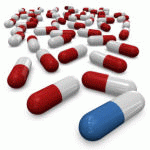Pharmacology
|
19 february 2019 08:00:03 |
| Marine Drugs, Vol. 17, Pages 123: Astaxanthin Ameliorates Lipopolysaccharide-Induced Neuroinflammation, Oxidative Stress and Memory Dysfunction through Inactivation of the Signal Transducer and Activator of Transcription 3 Pathway (Marine Drugs) |
|
Tweet Astaxanthin (AXT), a xanthophyll carotenoid compound, has potent antioxidant, anti-inflammatory and neuroprotective properties. Neuroinflammation and oxidative stress are significant in the pathogenesis and development of Alzheimer’s disease (AD). Here, we studied whether AXT could alleviate neuroinflammation, oxidative stress and memory loss in lipopolysaccharide (LPS) administered mice model. Additionally, we investigated the anti-oxidant activity and the anti-neuroinflammatory response of AXT in LPS-treated BV-2 microglial cells. The AXT administration ameliorated LPS-induced memory loss. This effect was associated with the reduction of LPS-induced expression of inflammatory proteins, as well as the production of reactive oxygen species (ROS), nitric oxide (NO), cytokines and chemokines both in vivo and in vitro. AXT also reduced LPS-induced β-secretase and Aβ1–42 generation through the down-regulation of amyloidogenic proteins both in vivo and in vitro. Furthermore, AXT suppressed the DNA binding activities of the signal transducer and activator of transcription 3 (STAT3). We found that AXT directly bound to the DNA- binding domain (DBD) and linker domain (LD) domains of STAT3 using docking studies. The oxidative stress and inflammatory responses were not downregulated in BV-2 cells transfected with DBD-null STAT3 and LD-null STAT3. These results indicated AXT inhibits LPS-induced oxidant activity, neuroinflammatory response and amyloidogenesis via the blocking of STAT3 activity through direct binding. |
| 82 viewsCategory: Biochemistry, Molecular Biology, Pharmacology |
 Marine Drugs, Vol. 17, Pages 119: Biosynthesis of Nutraceutical Fatty Acids by the Oleaginous Marine Microalgae Phaeodactylum tricornutum Utilizing Hydrolysates from Organosolv-Pretreated Birch and Spruce Biomass (Marine Drugs) Marine Drugs, Vol. 17, Pages 119: Biosynthesis of Nutraceutical Fatty Acids by the Oleaginous Marine Microalgae Phaeodactylum tricornutum Utilizing Hydrolysates from Organosolv-Pretreated Birch and Spruce Biomass (Marine Drugs)Marine Drugs, Vol. 17, Pages 122: Anti-Proliferation Activity of a Decapeptide from Perinereies aibuhitensis toward Human Lung Cancer H1299 Cells (Marine Drugs) 
|
| blog comments powered by Disqus |
MyJournals.org
The latest issues of all your favorite science journals on one page
The latest issues of all your favorite science journals on one page



